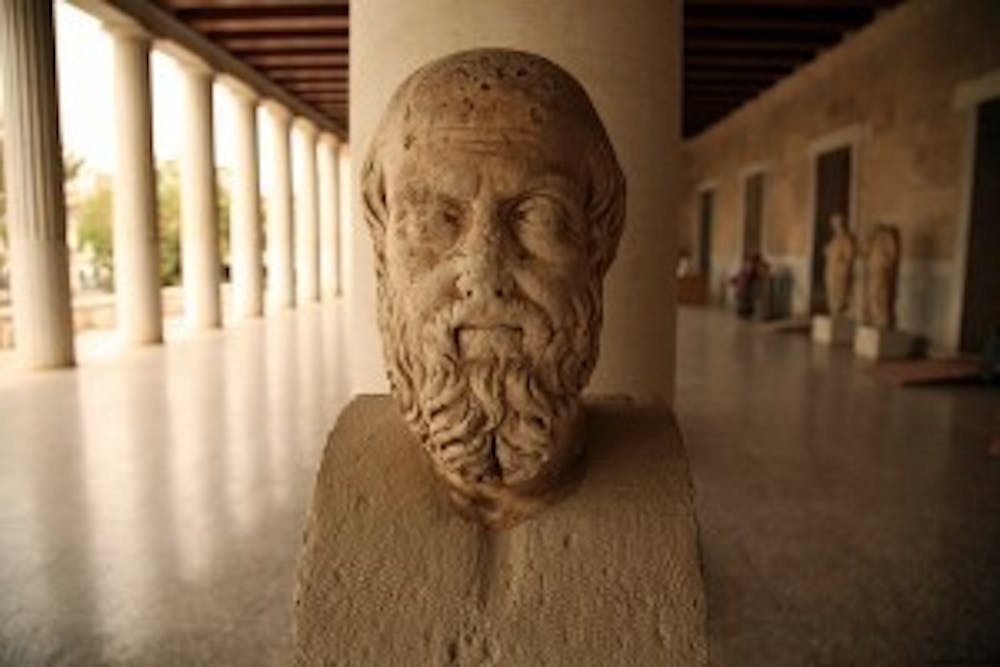I’m not entirely sure what happened in 440 B.C. I’m not sure if anyone really knows what happened then. When things are that far in the past they get hazy, so much of this is probably false. But something important to know about history is that what actually happened doesn’t always matter — what people believed to have happened arguably matters more. One thing that supposedly happened in 440 B.C. was that Democritus tried cutting cheese an infinite amount of times and hypothesized the existence of atoms from that experience (that was a fart joke). Another thing that supposedly happened in the same year was the publication of Histories by “Father of History” Herodotus.
Histories is noted to have begun the modern study of history which is kind of a big deal because without the study of history my column would probably just be pictures of Joe Biden eating ice cream. The actual content of the book is beyond both the scope of this column and my patience, so here is an extremely abridged summary. From 499 B.C. to 449 B.C., Persia and Greece had a couple of wars collectively known as the Greco-Persian Wars. Persia was big and wanted to be bigger. Greek city states wanted to stay Greek city states. So they fought. That probably means little to you except those wars had some pretty memorable events. During these wars there was the Battle of Marathon where the first world-record marathon time was supposedly set. There was also the Battle of Thermopylae which is the basis of the extremely historically accurate 2006 movie 300.
Herodotus was able to write this account of the Greco-Persian Wars by traveling throughout Greece and Asia Minor. He listened to all the stories from people about the wars in a systematic way, which is something no one else had really done before. By compiling all these different accounts Herodotus set the standard for historians to research the past and create messages for people to remember. Did he really though? Another name that has been used to describe Herodotus is the “Father of Lies.” Critics such as Thucydides, the guy who wrote The History of the Peloponnesian War, argue that Herodotus stuck a ton of folklore and fables into the historical narrative to make it seem more interesting.
It is also noted that Herodotus’s Histories were actually recited at gatherings like the Olympic Games to entertain people. Can a work like that be reliable? Does Histories even have histories? There is quite an intense argument going on between historians throughout history regarding the accuracy of Herodotus’s work. Some archaeological studies have provided evidence for some of the more contentious statements Herodotus makes. But Herodotus also makes a lot of statements about how the Gods intervened in human affairs, which has not been proven as of now.
Using Histories to understand the history of the fifth century would be kind of like using the musical Hamilton to understand the American Revolution. Hamilton is pretty good and entertaining except it shouldn’t really be the only source you cite when studying the American Revolution. I don’t think anyone can have a definitive answer on how accurate Histories is, but the best answer I’ve found so far is that we might as well use this work because it’s all we got.
Today, how we record our history is crucial. People in the future are going to use the content we produce now to judge our lifestyles and decisions or make their own choices so we better record our history right.
There wasn’t a comprehensive historical record on Democritus and now people remember him for trying to cut the cheese an infinite amount of times (and also beginning the study of atomic theory). The cheese part is most definitely incorrect, yet it was still taught in elementary school science class to the delight of students across America and to the detriment of Democritus’s legacy. So if you do end up doing something of historical significance, be sure that the history books get it right.






